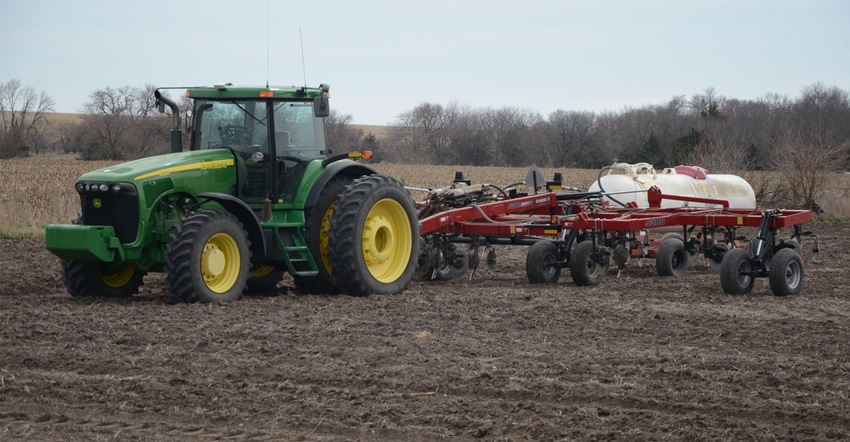December 16, 2019

Two new on-farm research protocols have been released to help growers evaluate the effect of using a nitrification inhibitor when applying anhydrous ammonia. These are among the many Nebraska On-Farm Research Network (NOFRN) guides for growers wanting to conduct tests using established research practices with their equipment on their farms.
Evaluating nitrogen inhibitors
After periods of heavy precipitation, such as those seen in many areas of Nebraska in spring and summer 2019, fall- or spring-applied anhydrous ammonia has the potential for leaching losses of nitrate-nitrogen before crop uptake in the next growing season. Nitrification inhibitors can slow down the conversion of ammonium to nitrate and decrease the risk of nitrate-nitrogen loss.
One of the new on-farm research plans evaluates the use of a nitrification inhibitor on nitrogen retention, NO3 leaching, crop yield and profits. The protocol includes a field plan for laying out a replicated treatment design of field-length strips with and without a nitrogen inhibitor. A total of five replications need to be harvested, although seven replications are preferred.
The second research option allows growers to evaluate fall- and spring-applied anhydrous ammonia with and without a nitrification inhibitor, looking at the effect of each treatment on nitrogen retention, NO3 leaching, crop yield and profits. Each replication includes four treatments. At least three replications are needed for this study and four are preferred.
More details for each of these research protocols, including treatment design, data collection, grower requirements and NOFRN contributions, are on the individual protocol pages linked in the descriptions.
Connecting with On-Farm Research
The Nebraska On-Farm Research Network offers guidance, support and analysis of the research results. In February, six meetings will be held across the state, so growers can present their work and discuss their findings with other growers and university faculty.
Plan now to attend one of these sites:
Beatrice. Feb. 18, Holiday Inn Express
Mead. Feb. 19, Eastern Nebraska Research and Extension Center
Norfolk. Feb. 20, Madison County Extension Office
Kearney. Feb. 26, Buffalo County Extension Office
Alliance. Feb. 27, Knight Museum and Sandhills Center, 908 Yellowstone Ave.
York. Feb. 28, Holtus Convention Center, jointly sponsored by USDA-NRCS and the Nebraska On-Farm Research Network
Check-in begins at 8:30 a.m. local time with the program running from 9 a.m. to 4 p.m. at all sites except Alliance, where the program will end at 2 p.m. MST.
While all locations will feature on-farm research related to cover crops and soil health, the York location will focus specifically on these topics with special guest speakers.
You can register and secure your spot now by emailing [email protected] or calling 402-624-8030 and indicating which location you plan to attend.
If you're interested in conducting a research trial on your farm in 2020, check out some of the resources available at cropwatch.unl.edu/farmresearch/getting-started.
Source: UNL CropWatch, which is solely responsible for the information provided and is wholly owned by the source. Informa Business Media and all its subsidiaries are not responsible for any of the content contained in this information asset.
You May Also Like




